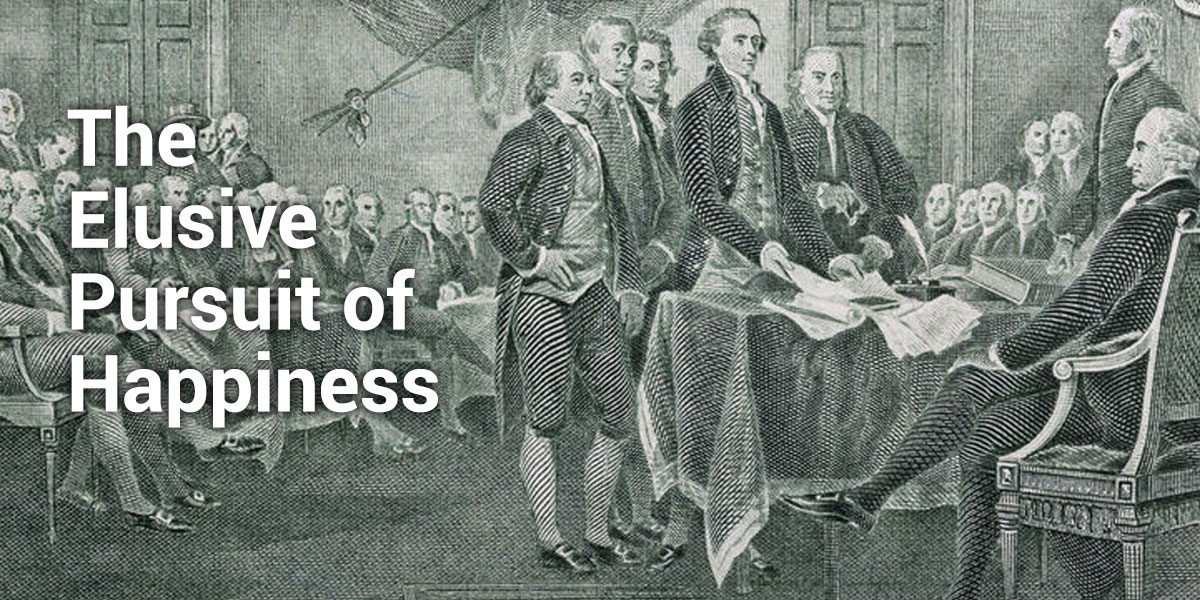We hold these truths to be self-evident, that all men are created equal, that they are endowed by their Creator with certain unalienable Rights, that among these are Life, Liberty and the pursuit of Happiness.
It was 1776 when Thomas Jefferson and the Committee of Five of the Second Continental Congress (including John Adams, Benjamin Franklin, Rodger Sherman, and Robert Livingston) drafted this famous introduction to the Declaration of Independence. It was to serve as the rallying cry of a young nation seeking independence from England. After close to 250 years, we Americans are still struggling to figure out what they meant by “the pursuit of happiness.”
There is a general misconception that happiness is a goal or a destination that must be actively pursued. Our culture teaches us from an early age that the correct formula is to “work hard, keep your nose clean, become successful (i.e. rich and famous) and this will lead to happiness”. So, we all pursue the visible trappings of material success and social status as a means of obtaining happiness. Yet we see evidence every day of individuals with a high degree of material success who are unhappy with their lives; many suffering from anxiety, depression, even some committing suicide. It is clear that there is something missing in this formula and our culture in general needs to be reexamined in light of such evidence.
I believe that our founding fathers, steeped in the philosophical traditions of ancient Greece and the Enlightenment, were conveying the message that everyone, from birth, has the right to pursue his or her own particular version of happiness without the interference from government. I also believe that by pursuit, they didn’t mean a quest, but a daily practice. So rather than seeking happiness as a distant goal, they wished to practice happiness every day as they saw fit.
Aristotle said; “Happiness is the meaning and the purpose of life, the whole aim and end of human existence”. While I believe this to be true, each person has different needs in life that make them happy and unhappy. So, we really need to first take a more critical look at the definitions of both happiness and success as they mean so many different things to different people. I also believe that the formula stated above needs to be reframed to read, “Be happy, work hard, keep your nose clean and this leads to success”. Let’s start with a proposed definition of happiness, building on the work of Maslow’s hierarchy of needs.
Happiness is not a goal or destination, but a state of mind that generates positive emotions fulfilling our basic need to “feel good” about ourselves; physically, mentally, emotionally and spiritually. The true measure of happiness is whether one truly feels good about himself despite his or her particular degree of material success, social prestige or life’s challenges.
In researching a wide range of philosophical, spiritual, phycological, and success literature, I have identified seven universal needs and desires that generate positive emotions that lead to such happiness.
-
- The physical need for surety (feeling safe, secure and in-control)
- Man is an instinctive animal with a strong need for survival and self-preservation
- Achieving surety reinforces the positive emotions of being self-sufficient, having peace of mind, and a feeling that
I am safe and in control
- The biological need for pleasure (good food, drink, music, laughter, beauty, fun and touch)
- Man is a biological animal with a strong need to satisfy his 5 senses
- Achieving pleasure leads to the positive emotion of gratification and a feeling of “I am satisfied”
- The mental need for worthwhile achievements (competing and winning in life’s arena; e.g., business, sports, arts, and games)
- Man is a competitive animal with a strong need to prove his significance and worth
- Successful achievement reinforces the positive emotion of recognition and respect a feeling that “I am important and worthy”
- The intellectual need for discovery (exploration, adventure, learning and growth)
- Man is a curious animal with a strong need to expand his horizons
- New discoveries reinforce the positive emotion of engagement and self-confidence and a feeling that “I am growing”
- The emotional need for meaningful and intimate relationships
- Man is a social animal with a strong need to love and be loved
- Meaningful relationships reinforce the positive emotion of acceptance, admiration and self-love and a feeling that “I am loved”
- The spiritual need for belonging (connection/devotion to something bigger than one’s self, be it a cause, a person, a community, or spirituality)
- Man is a spiritual animal with a strong need to expand beyond his personal boundaries and find his place in the universe
- Believing in a cause bigger than oneself reinforces the positive emotion of connection and a feeling that “I am significant”
- The foundational need for a healthy self-esteem, a subtle and often unconscious level of how one actually feels about himself, based on his individual sense of personal worth and importance. A healthy self-esteem underpins, drives and obtains feedback from the other six needs)
- Man is a reflective animal with the ability of self-examination, evaluation and personal growth
- High self-esteem results primarily from one’s accepting complete responsibility for his individual well-being and taking full charge of his own life. It is rooted in unconditional acceptance of himself, despite his mistakes, defeats and failures, as an innately worthy and important being
- The physical need for surety (feeling safe, secure and in-control)
Each one of us is driven, consciously or unconsciously, by several of these basic needs. I believe that understanding these needs and satisfying them in responsible ways is the key to happiness. I have found that very few individuals are aware of what exactly makes them truly happy and spend precious little time trying to find out. In the next series of Blogs, I will elaborate on each of these needs and point out their potential and limitations. I hope this will lead you to increase your level of awareness of what makes you happy.
If the subject of Designing your life to achieve happiness and success is of interest to you, sign up here for my newsletter.


